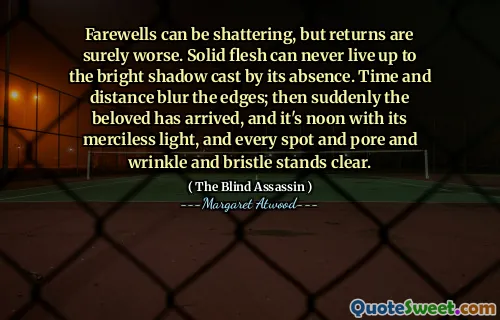Young girls have such sweet tooths. Or is that sweet teeth?
In Margaret Atwood's novel "The Blind Assassin," the author reflects on the nature of young girls and their fondness for sweets. This observation highlights a playful sense of innocence and the typical childhood affinity for sugary treats, sparking a discussion about growth and the complexities that come with adulthood. The quote also emphasizes the whimsical nature of language, as it humorously questions the correct term for a girl's craving for sweets. This blend of childhood nostalgia and linguistic curiosity enriches the narrative, inviting readers to ponder the innocence of youth contrasted with the eventual loss of that simplicity.
In Margaret Atwood's novel "The Blind Assassin," the author reflects on the nature of young girls and their fondness for sweets. This observation highlights a playful sense of innocence and the typical childhood affinity for sugary treats, sparking a discussion about growth and the complexities that come with adulthood.
The quote also emphasizes the whimsical nature of language, as it humorously questions the correct term for a girl's craving for sweets. This blend of childhood nostalgia and linguistic curiosity enriches the narrative, inviting readers to ponder the innocence of youth contrasted with the eventual loss of that simplicity.






